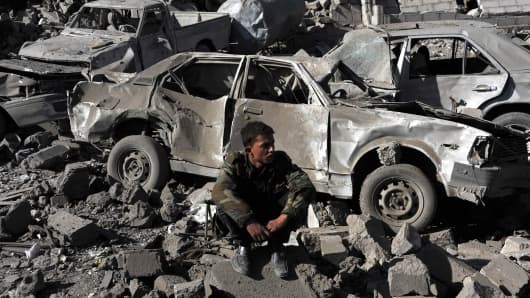Military intervention by Saudi Arabia in the conflict in Yemen is ringing alarm bells around the Middle East and the world.
Yemen, a historically impoverished and lawless Middle Eastern state, has been the poor relation to its oil-rich neighbors for decades. Its population, subject to a series of puppet governments since the British were driven out in 1967, is malnourished and mismanaged. It's not
hugely surprising that guerrilla fighters from other parts of the Middle East, including some from Al-Qaeda, have often hidden out in its countryside.
Yemen, a historically impoverished and lawless Middle Eastern state, has been the poor relation to its oil-rich neighbors for decades. Its population, subject to a series of puppet governments since the British were driven out in 1967, is malnourished and mismanaged. It's not
hugely surprising that guerrilla fighters from other parts of the Middle East, including some from Al-Qaeda, have often hidden out in its countryside.
Here, we take a look at the background to the current conflict and why it is so important to the region.
Location, location
Take a look at where Yemen is.
Yemen was a British colony for more than a century and has
been a key conduit for East-West trade for hundreds of years. The port
of Aden, currently under threat by Yemeni rebel Houthi forces, was where
ships used to stop to refuel as they carried goods from the eastern
part of the British empire to the U.K.
This strategic importance continues today. More than 3.4 million barrels of oil per day passed through Bab-el-Mandeb – the two-mile strait between Yemen and Africa - in 2013, according to U.S. government statistics.
This strategic importance continues today. More than 3.4 million barrels of oil per day passed through Bab-el-Mandeb – the two-mile strait between Yemen and Africa - in 2013, according to U.S. government statistics.
If that strait was closed, or became unsafe due to attacks
from anti-Western forces, oil tankers could be forced to sail all the
way around South Africa to reach European, North American, and South
American markets.
Saudi Arabia, one of the richest and most influential countries in the Gulf region, borders Yemen, so fighting there represents a threat to its prized stability - particularly given that many of its oilfields are in the north of the country, closer to Yemen. The Saudis also have plenty of money and equipment for a war. One out of every seven U.S. dollars spent on defence imports across the world in 2015 will be spent by Saudi Arabia, according to forecasts by research company IHS.
World's top weapons importer now in Middle East
Saudi Arabia, one of the richest and most influential countries in the Gulf region, borders Yemen, so fighting there represents a threat to its prized stability - particularly given that many of its oilfields are in the north of the country, closer to Yemen. The Saudis also have plenty of money and equipment for a war. One out of every seven U.S. dollars spent on defence imports across the world in 2015 will be spent by Saudi Arabia, according to forecasts by research company IHS.
World's top weapons importer now in Middle East
Religious divides
There are many who forecast that Yemen will be – or
already is – the site of a proxy war between Saudi Arabia and Iran,
emblematic of the increasingly fractious divide between Sunni and Shiite
Muslims.
Yemen has a Sunni majority, but also a significant Shiite minority, with some estimates suggesting the split is around 70:30 Sunni-Shiite. Saudi Arabia, on the other hand, is overwhelmingly Sunni Muslim, but with a significant Shia population near some of its oilfields.
The Sunni-majority Gulf states of the United Arab Emirates, Qatar, Kuwait and Bahrain are behind Saudi Arabia in the coalition of Middle Eastern states which has launched military action in Yemen. Shia-majority Oman, which also has a border with Yemen, is steering clear of supporting the intervention.
Yemen has a Sunni majority, but also a significant Shiite minority, with some estimates suggesting the split is around 70:30 Sunni-Shiite. Saudi Arabia, on the other hand, is overwhelmingly Sunni Muslim, but with a significant Shia population near some of its oilfields.
The Sunni-majority Gulf states of the United Arab Emirates, Qatar, Kuwait and Bahrain are behind Saudi Arabia in the coalition of Middle Eastern states which has launched military action in Yemen. Shia-majority Oman, which also has a border with Yemen, is steering clear of supporting the intervention.
Yemen's Houthi rebels, who are from the Shiite branch of
Islam, don't appear to have used the extremist tactics, such as suicide
bombings or massacres, of other Sunni militant groups like Islamic State
(ISIS) or Al-Qaeda.
Yet they do appear to have the support of Iran, which has raised Saudi concerns further.
Yet they do appear to have the support of Iran, which has raised Saudi concerns further.
Will the US get involved?
The West's nuclear negotiations with Iran are closer to a
positive conclusion than they have been for decades, so the U.S. is
unlikely to do anything which would throw them off course – such as send
in troops to Yemen.
What will happen if the Houthi rebellion is quashed?
Recently ousted President Abd Rabbuh Mansour Hadi, who was elected in 2012 after the previous ruler was deposed during the Arab Spring uprisings, is in an undisclosed location, believed to be outside the country, and may find it easier not to return to the country if the rebellion is quashed.Another regime backed by the Saudis, as well as the West, would likely be installed.


No comments:
Post a Comment